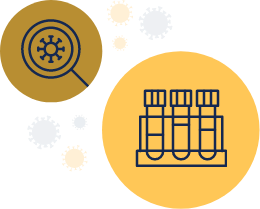Pathobiology Studies
RECOVER pathobiology studies use various research methods to better understand processes in the body that can cause Long COVID symptoms.

About
RECOVER researchers conduct pathobiology studies to understand how SARS-CoV-2, the virus that causes COVID-19, can produce changes in the body that lead to Long COVID. By focusing on specific changes called biological mechanisms, pathobiology studies can help answer questions such as:
- What happens in the organs and cells of people with Long COVID?
- Why do some people get Long COVID and others don’t?
- How do different changes in the body cause different Long COVID symptoms?
- What are the best ways to prevent and treat Long COVID?
Methods
In some pathobiology studies, researchers collect small amounts of biological materials (called biosamples or biospecimens) from people with and without Long COVID. These biospecimens include:
- Blood
- Saliva (spit)
- Stool (poop)
- Urine (pee)
- Nose fluid (snot)
Researchers then examine these biospecimens under a microscope or by using a range of instruments, machines, specialized tools, or tests. Some processes happening in the bodies of people with Long COVID are too small to detect otherwise. Magnifying the biospecimens or measuring them with specialized equipment can make individual cells and parts of cells more visible or possible to evaluate.
RECOVER pathobiology researchers also work to identify and measure biological mechanisms in consistent ways. Doing so allows researchers working on different pathobiology studies to compare their findings. It also allows researchers working on other RECOVER studies, like electronic health record (EHR) studies and tissue pathology (autopsy) studies, to learn from these pathobiology findings. This approach ensures the accuracy of results and helps speed up the understanding, diagnosis, treatment, and prevention of Long COVID.
Other pathobiology researchers study how specific animals and bacteria (also called model organisms) react to SARS-CoV-2, the virus that causes COVID-19. These organisms serve as a model for some systems of the human body because they have biological characteristics, including genes, proteins, and cell types, that are like those in humans. Model organisms also often reproduce quickly, meaning that scientists can more easily study the long-term effects of COVID-19 on a large population in a controlled laboratory setting.
Participation
RECOVER-funded pathobiology studies may use biospecimens provided by different groups of people participating in RECOVER studies:
- Adults (including women who were pregnant after 2020)
- Babies, children, and young adults (pediatric)
- Deceased people, also known as the tissue pathology (autopsy) cohort
Awards
RECOVER has awarded over $55 million in funding to support more than 60 pathobiology studies.
The first rounds of awards in 2022 and 2023 funded 45 pathobiology research projects. A second round in December 2024 awarded funding to 20 more projects. A third funding opportunity opened in August 2025.
These pathobiology studies’ findings can tell us more about:
- Risk factors: Traits that make some people more likely to develop Long COVID.
- Health effects: How Long COVID affects different parts of the body.
- Viral persistence: How and where SARS-CoV-2, the virus that causes COVID-19, can remain in the body.
- Diagnosis: Methods for improving the way Long COVID is diagnosed.
- Treatment: Ways to manage or prevent symptoms of Long COVID.
Applicants who responded to the following funding opportunities received RECOVER pathobiology awards:
- Notice of Special Interest (NOSI): Availability of Administrative Supplements for Research on Pathobiological Mechanisms of Post-Acute Sequelae of SARS-CoV-2 Infection. This NOSI provided more funding to RECOVER researchers whose current studies show promise to quickly advance our understanding of the biological mechanisms that cause Long COVID symptoms.
- Research Opportunity Announcements (ROAs): These 2 ROAs provided new funding to teams of RECOVER researchers from different specialty areas to support further analysis of biospecimens and data collected in current RECOVER studies.
The current funding opportunity (ROA OTA-21-015K) is open and accepting applications. View ROA OTA-21-015K for information about how to apply.
Publications
RECOVER pathobiology researchers share their findings with others by publishing study results in leading scientific journals. Recent pathobiology publications include:
News
New research findings shape our understanding of Long COVID. Stay informed by reading the latest news and participating in upcoming events.